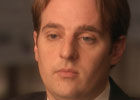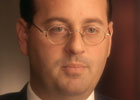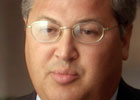A range of views on what's behind Vice President Dick Cheney's penchant for secrecy and how it evolved over his political career.
Charlie Savage
Author, Takeover: The Return of the Imperial Presidency and the Subversion of American Democracy
Vice President Cheney is an extremely secretive public official. He's talked a lot about the need for preserving candid advice and for not having people prying into affairs that are properly for the president and his men alone. He even said that he himself doesn't write things down, doesn't use e-mail, because he doesn't want to even raise the possibility of a situation in which his actions could someday be exposed, which would then constrain what he wants to do now.
Barton Gellman
The Washington Post
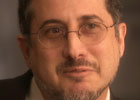
There are multiple layers and multiple justifications for secrecy in Cheney's worldview. One is if you talk about something to the American public, you're also talking to your enemies. And so if you have a significant public debate over how you're going to treat prisoners, how you're going to spy on enemies, you're telling the bad guys. So you can't do that.
He is also concerned with driving policy through government. These times, he feels, are simply too dangerous to allow dithering and simply too dangerous to allow least-common-denominator policies of the sort you get when a bureaucracy drags itself to some final conclusion and all the stakeholders are satisfied.
And so he has changed very much over the years in one respect: When he was chief of staff to President Ford, he had an iron fist over process. He advised his successors in that job never to allow oh-by-the-way decisions to be brought to the president, never to cut out people who had expertise or important responsibilities in a subject area. Make sure everyone had a chance to be heard. That's how you protect the president from making big mistakes.
By the time 9/11 happened, Cheney had become convinced that the biggest mistake you could make was to act slowly or to water down your policies. And so he began to operate in secret from his own colleagues, from the president's own top advisers, and he began to bypass the process that he used to protect. The important thing for him was to make things happen quickly, and if that meant that you don't tell the secretary of state, you don't tell the national security adviser, you don't tell the attorney general, so be it.
Bruce Fein
Associate deputy attorney general, 1981-'83
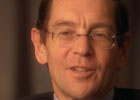
[Cheney's energy task force] was the first test case about this infatuation with secret government because this was a situation where the information sought was rather innocuous. … These aren't national security secrets of any sort. It's the things you would sit around the table all the time to talk about. Do we promote coal? Do we promote nuclear? What are the pollution elements here? How do we provide incentives of one sort or another? And the vice president would talk to people in business who would have their own interests and knowledge about what's feasible and what's not. ...
But he insisted that he wanted to keep who he was talking to secret because it was said, "Oh, unless we can do all this in secret, then no one will talk to us," which being someone who lives in Washington on K Street knows that's absurd. Everybody would love to get to the White House to talk to the vice president. That's how you get your power, is to tell and boast, "I was in the Lincoln bedroom," right? That's how you make your money.
But in any event, he just didn't want to have anybody know who was advising him, just for the sake of keeping the secret. And he pressed this all the way through the court system and there are various lawsuits he ultimately prevailed on. …
In a democracy, the rule is transparency. That's how you ensure accountability; that's how you deter folly or wrongdoing. As [Justice Louis] Brandeis said, "Sunshine is the best disinfectant." And you've got to have a good reason to keep something secret. That's the rule in any healthy democracy.
Bradford Berenson
Associate White House counsel, 2001-'03
[What do you think about the charge that this administration operates in an excessively secret manner? Vice President Cheney was criticized for wanting to keep secret the records of whom his energy task force met with.]
Yes, it's a matter of principle and the public interest. The president needs to be able to get candid advice. That advice can only emerge from a process in which people feel free to float even really stupid ideas. If internal deliberations inside the administration are routinely subject not only to public view but to public view in the context of congressional efforts to weaken a president, either institutionally or politically from a partisan perspective, the quality of internal debate will be seriously degraded. …
And this is something that's been recognized again since the founding of the republic. People forget that the Constitutional Convention was itself conducted in total secrecy and all members of the convention basically subscribed to an oath that they would never discuss the deliberations at the convention until after all of the participants had died. I don't think anybody felt that the work product of the Constitutional Convention was the poorer for that rule. Quite the contrary. …
Jack Goldsmith
Assistant attorney general, Office of Legal Counsel, 2003-'04
I think it's no accident that for the [legal] opinions that were the most flawed, these were also the opinions that were the most secretive, at least in my experience. I think in retrospect that the absence of deliberation that it was felt necessary to have after 9/11, in the emergency after 9/11, led to some of the problems. ...
Secrecy is sort of the heart and soul of everything they want to do from almost the very beginning.
They were very secretive about everything they did. And again, there was a good reason for it and a not-so-good reason for it. The good reason was they wanted to prevent leaks. In my book I quote Justice [Potter] Stewart in the Pentagon Papers case saying ... that when everything is secret nothing is secret. Certainly that probably describes a lot of what happened in the Bush administration.
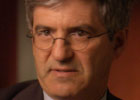
Vice President Cheney's office operates with a level of secrecy that probably exceeds that of any other White House office in recent memory. You can call up Vice President Cheney's office all you want and get a press officer. They'll never tell you anything that isn't already in the public record. They'll never make officials, much less the vice president himself, available to be interviewed unless they already have decided they want to put the vice president out there. His aides, like David Addington, never talk to the press. They view that as almost a religious obligation not to talk to the press. So you can't get any information out of them.
How does this connect into the executive power theory which David Addington and the vice president have been chief proponents of?
It fits completely hand in glove with the Cheney view of executive power, which is that the White House operates with supreme power under our Constitution. … If you believe that the White House has sort of unchecked authority to make decisions in wartime without having to answer questions or share information with the Congress or the courts, then you almost by definition believe you have the power to do that in secret.
home . introduction . watch online . interviews . themes . join the discussion
producer's chat . readings & links . site map . dvd & transcript . press reaction
teacher's guide . credits . privacy policy . journalistic guidelines . FRONTLINE series home . wgbh . pbs
posted october 16, 2007
FRONTLINE is a registered trademark of wgbh educational foundation.
main photograph © corbis, all rights reserved
web site copyright WGBH educational foundation
